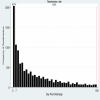Factors influencing early and late readmissions in Australian hospitalised patients and investigating role of admission nutrition status as a predictor of hospital readmissions: a cohort study
- PMID: 29950478
- PMCID: PMC6020977
- DOI: 10.1136/bmjopen-2018-022246
Factors influencing early and late readmissions in Australian hospitalised patients and investigating role of admission nutrition status as a predictor of hospital readmissions: a cohort study
Abstract
Objectives: Limited studies have identified predictors of early and late hospital readmissions in Australian healthcare settings. Some of these predictors may be modifiable through targeted interventions. A recent study has identified malnutrition as a predictor of readmissions in older patients but this has not been verified in a larger population. This study investigated what predictors are associated with early and late readmissions and determined whether nutrition status during index hospitalisation can be used as a modifiable predictor of unplanned hospital readmissions.
Design: A retrospective cohort study.
Setting: Two tertiary-level hospitals in Australia.
Participants: All medical admissions ≥18 years over a period of 1 year.
Outcomes: Primary objective was to determine predictors of early (0-7 days) and late (8-180 days) readmissions. Secondary objective was to determine whether nutrition status as determined by malnutrition universal screening tool (MUST) can be used to predict readmissions.
Results: There were 11 750 (44.8%) readmissions within 6 months, with 2897 (11%) early and 8853 (33.8%) late readmissions. MUST was completed in 16.2% patients and prevalence of malnutrition during index admission was 31%. Malnourished patients had a higher risk of both early (OR 1.39, 95% CI 1.12 to 1.73) and late readmissions (OR 1.23, 95% CI 1.06 to 128). Weekend discharges were less likely to be associated with both early (OR 0.81, 95% CI 0.74 to 0.91) and late readmissions (OR 0.91, 95% CI 0.84 to 0.97). Indigenous Australians had a higher risk of early readmissions while those living alone had a higher risk of late readmissions. Patients ≥80 years had a lower risk of early readmissions while admission to intensive care unit was associated with a lower risk of late readmissions.
Conclusions: Malnutrition is a strong predictor of unplanned readmissions while weekend discharges are less likely to be associated with readmissions. Targeted nutrition intervention may prevent unplanned hospital readmissions.
Trial registration: ANZCTRN 12617001362381; Results.
Keywords: epidemiology; internal medicine; quality in health care.
© Article author(s) (or their employer(s) unless otherwise stated in the text of the article) 2018. All rights reserved. No commercial use is permitted unless otherwise expressly granted.
Conflict of interest statement
Competing interests: None declared.
Figures


Similar articles
-
Malnutrition and its association with readmission and death within 7 days and 8-180 days postdischarge in older patients: a prospective observational study.BMJ Open. 2017 Nov 12;7(11):e018443. doi: 10.1136/bmjopen-2017-018443. BMJ Open. 2017. PMID: 29133331 Free PMC article.
-
Inflammatory Bowel Disease: Predictors and Causes of Early and Late Hospital Readmissions.Inflamm Bowel Dis. 2017 Oct;23(10):1832-1839. doi: 10.1097/MIB.0000000000001242. Inflamm Bowel Dis. 2017. PMID: 28858068
-
Malnutrition Identified by Academy of Nutrition and Dietetics/American Society for Parenteral and Enteral Nutrition Is Associated With More 30-Day Readmissions, Greater Hospital Mortality, and Longer Hospital Stays: A Retrospective Analysis of Nutrition Assessment Data in a Major Medical Center.JPEN J Parenter Enteral Nutr. 2018 Jul;42(5):892-897. doi: 10.1002/jpen.1021. Epub 2018 Jan 31. JPEN J Parenter Enteral Nutr. 2018. PMID: 29385244
-
Targeting malnutrition: Nutrition programs yield cost savings for hospitalized patients.Clin Nutr. 2020 Sep;39(9):2896-2901. doi: 10.1016/j.clnu.2019.12.025. Epub 2019 Dec 26. Clin Nutr. 2020. PMID: 31917050 Review.
-
Clinical and Economic Value of Nutrition in Healthcare: A Nurse's Perspective.Nutr Clin Pract. 2019 Dec;34(6):832-838. doi: 10.1002/ncp.10405. Epub 2019 Sep 22. Nutr Clin Pract. 2019. PMID: 31544300 Review.
Cited by
-
The Association between Nutritional Status and In-Hospital Mortality among Patients with Acute Coronary Syndrome-A Result of the Retrospective Nutritional Status Heart Study (NSHS).Nutrients. 2020 Oct 11;12(10):3091. doi: 10.3390/nu12103091. Nutrients. 2020. PMID: 33050636 Free PMC article.
-
Why do we Need to Evaluate Therapeutic Diets for Cardiac Patients Admitted in Healthcare Institutions?Acta Med Philipp. 2025 Jan 15;59(1):5-6. doi: 10.47895/amp.v59i1.12568. eCollection 2025. Acta Med Philipp. 2025. PMID: 39897143 Free PMC article. No abstract available.
-
CAN WE DIAGNOSE SARCOPENIA USING ANTERIOR FEMORAL MUSCLE THICKNESS IN PATIENTS WITH CARDIOVASCULAR DISEASE?J Rehabil Med Clin Commun. 2024 Jan 17;7:12378. doi: 10.2340/jrmcc.v7.12378. eCollection 2024. J Rehabil Med Clin Commun. 2024. PMID: 38269334 Free PMC article.
-
Interrelationships between Dietary Outcomes, Readmission Rates and Length of Stay in Hospitalised Oncology Patients: A Scoping Review.Nutrients. 2023 Jan 12;15(2):400. doi: 10.3390/nu15020400. Nutrients. 2023. PMID: 36678271 Free PMC article.
-
Readmission in acute pancreatitis: Etiology, risk factors, and opportunities for improvement.Surg Open Sci. 2022 Nov 7;10:232-237. doi: 10.1016/j.sopen.2022.10.010. eCollection 2022 Oct. Surg Open Sci. 2022. PMID: 36389270 Free PMC article.
References
-
- Royal College of Physicians. Hospitals on the Edge? The Time for Action. London: Royal College of Physicians, 2012. https://www.rcplondon.ac.uk/guidelines-policy/hospitals-edge-time-action.
Publication types
MeSH terms
Associated data
LinkOut - more resources
Full Text Sources
Other Literature Sources
Medical
